
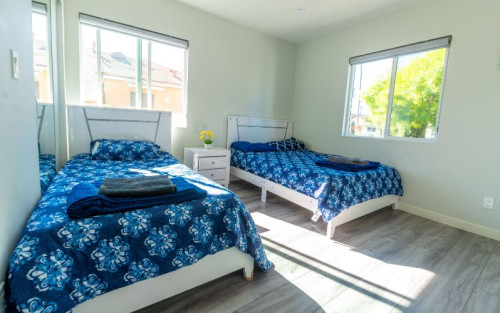
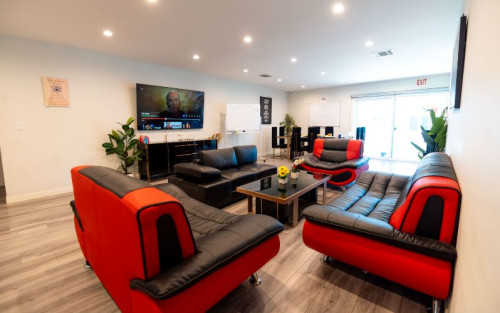




LA Wellness Home
This provider's information has been quality-checked by Recovery.com's Research Team for accuracy and completeness, including center verification through appropriate third-party organizations.
Treatment Focus
This center treats primary substance use disorders and co-occurring mental health conditions. Your treatment plan addresses each condition at once with personalized, compassionate care for comprehensive healing.
Primary Level of Care
Offering intensive care with 24/7 monitoring, residential treatment is typically 30 days and can cover multiple levels of care. Length can range from 14 to 90 days typically.
Treatment Focus
This center treats primary substance use disorders and co-occurring mental health conditions. Your treatment plan addresses each condition at once with personalized, compassionate care for comprehensive healing.
Primary Level of Care
Offering intensive care with 24/7 monitoring, residential treatment is typically 30 days and can cover multiple levels of care. Length can range from 14 to 90 days typically.
Provider's Policy
LA Wellness Home offers free insurance verification. If you’d like to know if your insurance can cover treatment, feel free to give us a call or use the secure & confidential insurance verification form. An insurance specialist from LA Wellness Home will confidentially verify your insurance coverage and contact you to review your coverage. We accept PPO insurance and private pay only.
LA Wellness Home
LA Wellness Home
About LA Wellness Home
LA Wellness Home is a warm, welcoming facility treating addiction and co-occurring mental health conditions with clinically led detox, residential care, outpatient, and sober living. They use various evidence-based and holistic therapies to offer a well-rounded treatment experience. An initial consultation and addiction diagnosis help guide and personalize each client’s unique treatment plan.
Structured Care Led by Professionals
A typical day at LA Wellness Home includes 6 hours of group therapy, with 2 groups before and after lunch, and mandatory off-site 12-Step meetings on Tuesdays and Fridays. Clients receive 2 hours of 1:1 therapy weekly; one with an addictions counselor and one hour with their therapist. They provide medication-assisted treatment (MAT) to help ease detox and withdrawals, with 24/7 supervision throughout. Their team includes a psychiatrist, physician/addictionist, full-time psychiatric nurse, RadT technicians, therapists, and counselors. All meet weekly to discuss progress and adjust treatment plans as needed. Clients receive daily medical check-ins, a weekly psychiatric evaluation, and unlimited case management services throughout treatment.
Evidence-Based Therapies for Clients and Families
LA Wellness Home’s evidence-based therapies include cognitive behavioral therapy (CBT), dialectical behavioral therapy (DBT), twice-weekly in person 12-Step meetings (virtual on Saturdays), and trauma-informed therapies. Psychoeducation for clients and their family members provides education on addiction, mental health, and recovery. Families can also join multi-family support groups and attend weekly family therapy with their loved one. After residential care, clients can attend their nearby outpatient care and stay in LA Wellness Home’s safe sober living accommodations for continued structure.
Holistic Services and Engaging Sober Activities
Clients at LA Wellness Home can enjoy nutritious chef-prepared meals throughout their stay, plus weekly acupuncture and massage services. They can also join on-site yoga and sound bath sessions each weekend, with hour-long sessions on Saturday and Sunday. LA Wellness Home takes clients on group outings each Sunday to bring them into the LA area and connect them to the community. Outings include group hikes, beach trips to Santa Monica, museum tours, walking through botanical gardens, self-care appointments, visiting the LA zoo, and going to movies.
Highlights from the Center
Highlights
These highlights are provided by and paid for by the center.
1-on-1 Counseling
Joint Commission Accredited
Customized Treatment Plans
2+ Individual Sessions a Week
Center Overview
Treatment Focus
This center treats primary substance use disorders and co-occurring mental health conditions. Your treatment plan addresses each condition at once with personalized, compassionate care for comprehensive healing.
Joint Commission Accredited
The Joint Commission accreditation is a voluntary, objective process that evaluates and accredits healthcare organizations (like treatment centers) based on performance standards designed to improve quality and safety for patients. To be accredited means the treatment center has been found to meet the Commission's standards for quality and safety in patient care.

Insurance Accepted
Cash Pay Rates
Estimated Cash Pay Rate
Center pricing can vary based on program and length of stay. Contact the center for more information. Recovery.com strives for price transparency so you can make an informed decision.
Meet your care team

Dr. Julio Meza
Medical Director
MD, Addictionist

Zachary Dorfman
Program Director
CDAC II

Dr. Eric Chaghouri
MD Psychiatrist

Thais Siewert
Psychiatrist Nurse
DNP
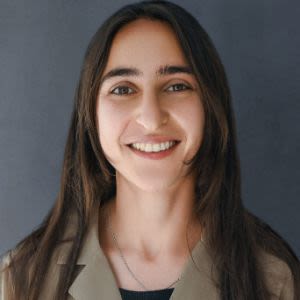
Alina Sargsian
Clinical Coordinator
CATC III
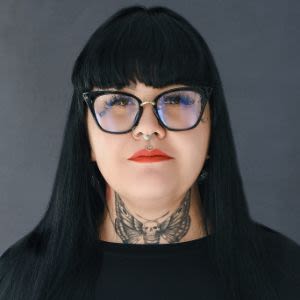
Joanna Webber
Counselor
CDAC I
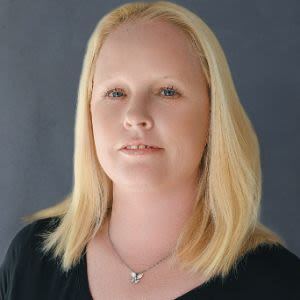
Rachel Mullaley
Counselor
RADT I, CDAC I
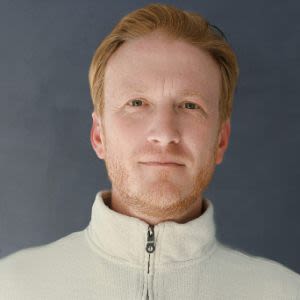
Richard Hill
Group Facilitator
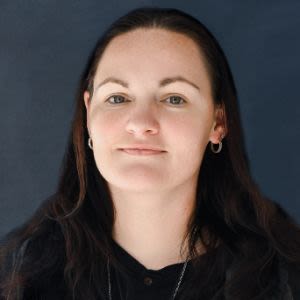
Jessica Johnson
Chart Auditor
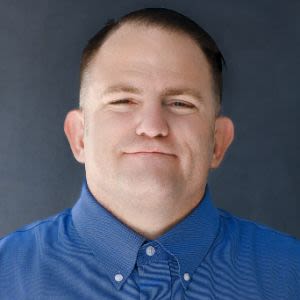
Gary Dean
RadT Technician

Gregory Otte
RadT Technician

Taylor Chadwick
RadT Technician
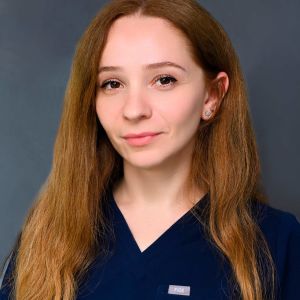
Liana Kaparetyan
LVN




Levels of Care







Treatment
Specializations
Alcohol
Using alcohol as a coping mechanism, or drinking excessively throughout the week, signals an alcohol use disorder.
Co-Occurring Disorders
A person with multiple mental health diagnoses, such as addiction and depression, has co-occurring disorders also called dual diagnosis.
Cocaine
Cocaine is a stimulant with euphoric effects. Agitation, muscle ticks, psychosis, and heart issues are common symptoms of cocaine abuse.
Drug Addiction
Drug addiction is the excessive and repetitive use of substances, despite harmful consequences to a person's life, health, and relationships.
Heroin
Heroin is a highly addictive and illegal opioid. It can cause insomnia, collapsed veins, heart issues, and additional mental health issues.
Methamphetamine
Methamphetamine, or meth, increases energy, agitation, and paranoia. Long-term use can result in severe physical and mental health issues.
Opioids
Opioids produce pain-relief and euphoria, which can lead to addiction. This class of drugs includes prescribed medication and the illegal drug heroin.
Who We Treat
Young Adults
Emerging adults ages 18-25 receive treatment catered to the unique challenges of early adulthood, like college, risky behaviors, and vocational struggles.
LGBTQ+
Addiction and mental illnesses in the LGBTQ+ community must be treated with an affirming, safe, and relevant approach, which many centers provide.
Men and Women
Men and women attend treatment for addiction in a co-ed setting, going to therapy groups together to share experiences, struggles, and successes.
Professionals
Busy, high-ranking professionals get the personalized treatment they need with greater accommodations for work, privacy, and outside communication.
Approaches
Family Involvement
Providers involve family in the treatment of their loved one through family therapy, visits, or both–because addiction is a family disease.
Holistic
A non-medicinal, wellness-focused approach that aims to align the mind, body, and spirit for deep and lasting healing.
Individual Treatment
Individual care meets the needs of each patient, using personalized treatment to provide them the most relevant care and greatest chance of success.
Twelve Step
Incorporating spirituality, community, and responsibility, 12-Step philosophies prioritize the guidance of a Higher Power and a continuation of 12-Step practices.
Therapies
1-on-1 Counseling
Patient and therapist meet 1-on-1 to work through difficult emotions and behavioral challenges in a personal, private setting.
Play Therapy
This approach is commonly used with children. It incorporates elements of play and self-expression, like boardgames, finger painting, dolls, and blocks.
Transcranial Magnetic Stimulation
Localized magnetic pulses stimulate areas of the brain to increase brain activity and reduce abnormal functions.
Spontaneous Healing Intra-systemic Process
This form of trauma therapy improves self-awareness. By accepting the physical discomfort of emotional stress, patients activate the body's natural healing response.
Expressive Arts
Creative processes like art, writing, or dance use inner creative desires to help boost confidence, emotional growth, and initiate change.
Family Therapy
Family therapy addresses group dynamics within a family system, with a focus on improving communication and interrupting unhealthy relationship patterns.
Medication-Assisted Treatment
Combined with behavioral therapy, prescribed medications can enhance treatment by relieving withdrawal symptoms and focus patients on their recovery.
Pastoral Counseling
Based on religious principles, this branch of counseling combines spirituality with psychotherapy.
Psychoeducation
This method combines treatment with education, teaching patients about different paths toward recovery. This empowers them to make more effective decisions.
Conditions We Treat
Anger
Although anger itself isn't a disorder, it can get out of hand. If this feeling interferes with your relationships and daily functioning, treatment can help.
Anxiety
Anxiety is a common mental health condition that can include excessive worry, panic attacks, physical tension, and increased blood pressure.
Bipolar
This mental health condition is characterized by extreme mood swings between depression, mania, and remission.
Depression
Symptoms of depression may include fatigue, a sense of numbness, and loss of interest in activities. This condition can range from mild to severe.
Obsessive Compulsive Disorder (OCD)
OCD is characterized by intrusive and distressing thoughts that drive repetitive behaviors. This pattern disrupts daily life and relationships.
Post Traumatic Stress Disorder
PTSD is a long-term mental health issue caused by a disturbing event or events. Symptoms include anxiety, dissociation, flashbacks, and intrusive thoughts.
Trauma
Some traumatic events are so disturbing that they cause long-term mental health problems. Those ongoing issues can also be referred to as "trauma."
Substances We Treat
Alcohol
Using alcohol as a coping mechanism, or drinking excessively throughout the week, signals an alcohol use disorder.
Benzodiazepines
Benzodiazepines are prescribed to treat anxiety and sleep issues. They are highly habit forming, and their abuse can cause mood changes and poor judgement.
Chronic Relapse
Consistent relapse occurs repeatedly, after partial recovery from addiction. This condition requires long-term treatment.
Co-Occurring Disorders
A person with multiple mental health diagnoses, such as addiction and depression, has co-occurring disorders also called dual diagnosis.
Cocaine
Cocaine is a stimulant with euphoric effects. Agitation, muscle ticks, psychosis, and heart issues are common symptoms of cocaine abuse.
Drug Addiction
Drug addiction is the excessive and repetitive use of substances, despite harmful consequences to a person's life, health, and relationships.
Ecstasy
Ecstasy is a stimulant that causes intense euphoria and heightened awareness. Abuse of this drug can trigger depression, insomnia, and memory problems.
Heroin
Heroin is a highly addictive and illegal opioid. It can cause insomnia, collapsed veins, heart issues, and additional mental health issues.
Psychedelics
Hallucinogenic drugs—like LSD—cause euphoria and increased sensory experiences. When abused, they can lead to depression and psychosis.
Languages
Aftercare
Experience
Personal Amenities
Amenities
Special Considerations
Couples program
Using gentle clinical care, therapists guide patients and their partner through guided sessions to address issues and work towards lasting solutions.
LGBTQ group
Group therapy unites LGBTQ+ patients in a safe and culturally competent setting, encouraging peer support under the expert leadership of a therapist.
Young Adults Program
Programs for young adults bring teens 18+ together to discuss age-specific challenges, vocational and educational progress, and successes in treatment.
Activities
Yoga
Yoga is both a physical and spiritual practice. It includes a flow of movement, breathing techniques, and meditation.
Off-Site Activities
Off-Site Amenities

What people are saying
Accommodations
Food & Nutrition
Treatment
Value
Pros
- Beautiful Location (16)
- Luxurious Accommodations (13)
- Excellent & Effective Treatment Programming (16)
- Personalized (16)
Cons
- Not Enough Time With Therapist (2)
See More
Emelia
Carlos O.
Michael L
Tim H
Adonica Hensley
We love hearing about your treatment experience
Help individuals and families seeking treatment by sharing your first-hand experience with this treatment provider. Review Guidelines.





